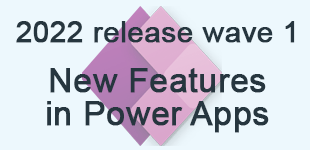
#1 Command designer with Power Fx
Starting with a new tool that many users will be happy to see. The Command Designer will provide app makers with the ability to customise command (ribbon) bars in their model driven apps. This includes the ability to use new low code Power Fx formulas. Historically, we would use external tools such as the excellent Ribbon Workbench to customise ribbons so it is great to finally see a native UI driven way of achieving this provided within Power Apps.
#2 Makers can collaborate together on the same app by merging changes
When creating canvas apps, as they begin to grow in complexity, it would often be beneficial to have multiple app makers working on individual aspects of the app to speed up the development process. This will soon be possible with the new capabilities being brought to the Power Apps Studio. Multiple app makers will be able to edit the same canvas app simultaneously with changes being merged and stored in Azure DevOps, GitHub, or any Git provider.
#3 Power Fx named formulas to ease development and improve performance
A subtle change to the way in which formulas are written within apps will allow app makers to create named formulas which can be referenced anywhere within the app to provide up to date, accurate values and eliminate confusion and potential future issues.
For example, rather than having to use Set() to explicitly set a variable X to the first record in a list, makers can instead just define it as X = First(MyList). The main benefit to this approach is that if the order of the list changes at any point, the value of X will still represent the current first item. Previously a maker would have had to call Set() each time there was a possibility that the value had changed making it harder to keep track of all areas within the app that could affect the output.
#4 Power Fx formulas provide richer and easier to use column calculations in Microsoft Dataverse
The integration of Power Fx into column settings provides greater flexibility, and adds many more functions and richer data type support than was previously available within calculated fields. In addition to this, formula columns can now be calculated in real time, providing more immediate feedback to end users.
#5 Build forms entirely using features available in the modern form designer
Finally, the new modern form designer will now support all the features that were previously available in the legacy editor. Customisers will no longer need to switch between the modern and classic interfaces when designing forms for model driven apps. With the new editor now able to provide all the existing functionality, expect Microsoft to deprecate the classic editor in a future wave.
If you have any questions or would like to find out more about the features in wave 1 2022 for App Makers, please contact us


